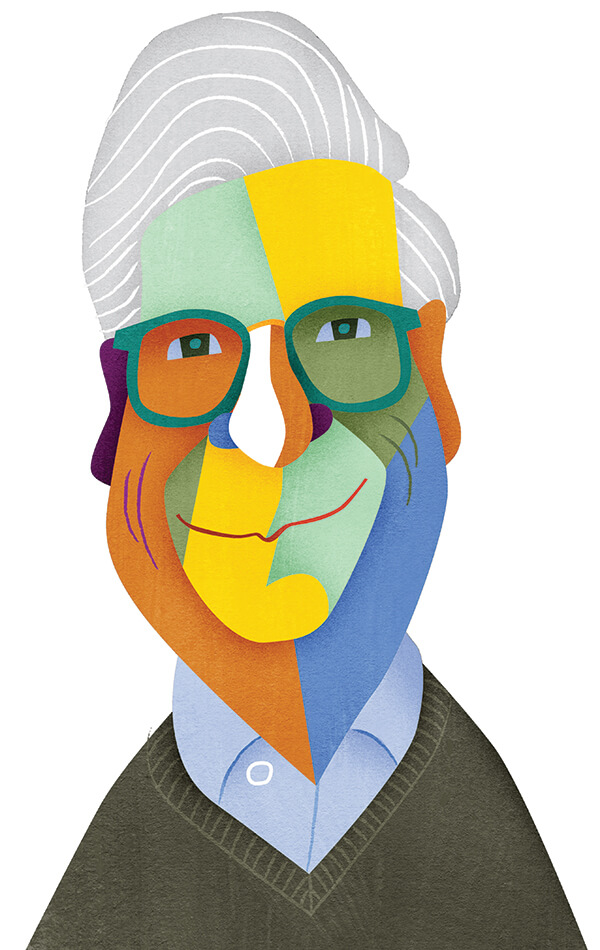What Does It Take to Cast a Hit Series?
What Does It Take to Cast a Hit Series?
John Levey ’69—casting director on iconic TV shows including ER, West Wing, and others—shares what it takes to be right for a role.

(Illustration: David Cowles for Rochester Review)
I started my career directing theater. How I got into casting supports the idea that we should all be open to happy accidents. A production I was directing got bad reviews, and it was the first time in my career that I had been publicly criticized for not doing a good job. I went out for a cocktail after the show with Barbara Claman, who was a famous casting director in New York and Los Angeles. She said, “If you’re going to take it this hard, kid, you should come and work for me.” And I did the next Monday. We cast TV, movies, theater, all kinds of stuff, and I got an education by fire.
Sometimes I may have someone in mind for a role, but generally, I’m a big believer in the process. That means you get the script and you read it again and again to get a sense of what’s going on emotionally and intellectually and spiritually for the characters. Then you have a meeting with the writer and the director, called a tone meeting, where we discuss age, gender, race, any specific kinds of things that might be important—or whether none of those things is important. Then I communicate with people who represent actors, they submit actors’ pictures and resumes, I sift through all of that, auditions are set up, and we collaborate with producers, directors, and writers on a decision.
I say being right for a role is like having a good haircut. You never look like you need one, nor like you just got one. You just look natural. George Clooney as Dr. Doug Ross in ER was an example of someone with a good haircut. Ross was a pediatrician, and the idea was he would be someone able to interact with children who are ill, or in pain, or in trouble with a kind of compassionate sense of humor and an ability to reach them at their own level. In his personal life, he was to be unsettled man in his mid-30s and a serial dater. And dashing. We had Clooney in mind immediately, partly because he had what was called a holding deal at Warner Bros.— they owned his services for pilots—but Clooney was also everything shows were looking for back then: the funny, smart, sexy, slightly dangerous, a bit vulnerable, 30-something leading man.
Racial balance was a central focus for casting ER, and I like to think we—the writers, producers, directors and I—valued diversity before it was a mandate. We had tremendous diversity especially in what I dub “the trampoline”—the recurring characters and guest stars. In the case of ER, those were the working people of Cook County General, the ones who inform the show’s character and pace. We were telling raw stories from a big city hospital emergency room, and we were also acutely aware that most of the patients in those settings are the poor and the disenfranchised.
One of the exciting parts of the job is witnessing young talent—and if you can, playing some role in helping them advance their career. A memorable example was when I was casting Growing Pains. We were looking for a young teenage boy to join the cast, and Leonardo DiCaprio was represented by someone I had a good relationship with in those days. She suggested him to me, he came in and read, and eventually was hired for the part. And then he was offered a film, This Boy’s Life. I went to the president of Warner Bros. TV and said we should let him out of his contract to do this job. We weren’t sure if Growing Pains was coming back the next year. If we got picked up for another season, it would help us with promotion. And if we didn’t get picked up, we would be doing a good service for a talented young man. He agreed, and DiCaprio went and did This Boy’s Life and hasn’t looked back in 35 years.
John Levey ’69
Home: Burbank, California
Casting director; author of Right for the Role: Breakdowns, Breakups and Breakthroughs from 35 Years of Casting Iconic TV Shows (Legacy Launch Pad, 2022)
Major credits: China Beach, ER, West Wing, Shameless, Animal Kingdom
On life lessons from theater at Rochester: “Under the leadership of Suzie Smart ’69 and Vic Becker ’69, we started the University of Rochester Summer Theater in 1968 in an old, abandoned cement factory, just off campus, on River Road. I look back at that, and the work we did there was just really fun and exciting. We were a raucous group of theater lovers who formed a community and a creative collaboration and really, that’s what my memoir is about. It’s about finding your role in a collaborative community.”
— Interview by Karen McCally ’02 (PhD)
This article originally appeared in the fall 2022 issue of the Rochester Review magazine.


